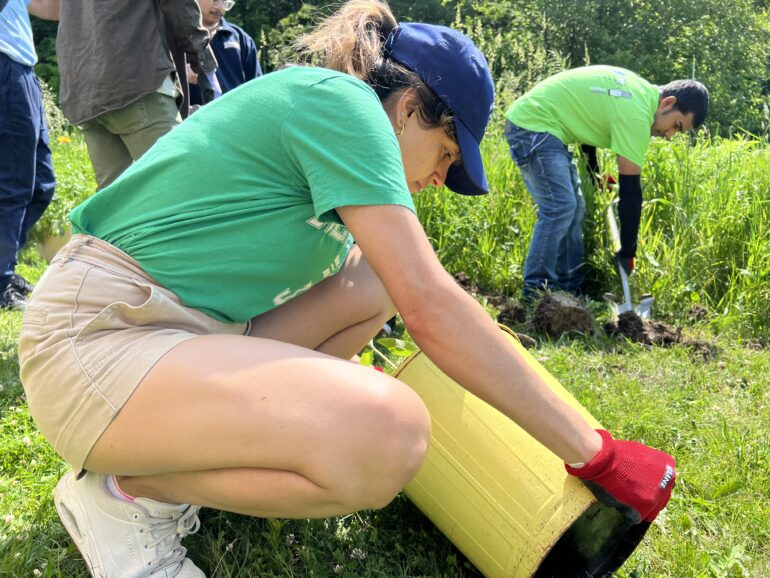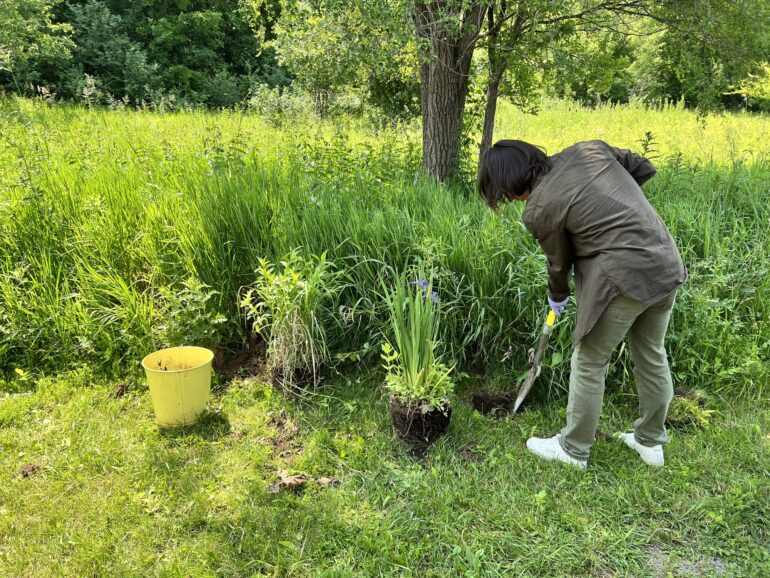Students and faculty kick-started Pollinator Week by planting 10 new native plants in the Humber Arboretum on Monday.
Hosted by the Office of Sustainability, the event attracted around a dozen people to learn about nature. The ‘native plants blitz’ event allowed participants to take a tour of the Humber Arboretum and to plant native plants into the ground.
Pollinator Week is celebrated annually during the third week of June to appreciate pollinators and recognize their role in ecosystems. This was the first time the Office of Sustainability hosted the event to mark the week.
Event organizer Gabi Hentschke said that while Pollinator Week is celebrated across Canada, it’s especially important for Humber College, certified a bee campus, to protect pollinators and their habitats. Humber became a bee campus in August 2021 to sustainably support bee populations and currently has bee conservation areas in the arboretum and on campus.
“It’s part of our commitment as a bee campus not only to look after our pollinators to create healthy habitats for them, but also raising awareness around pollinators, hosting events, engaging our college community, and explaining really just how important it is for the maintenance of healthy ecosystems,” Hentschke said.
Some of the ways to protect pollinators are by planting pollinator-friendly plants and avoiding the use of harsh chemicals in landscaping, Hentschke said.
The event was led by Mia Maceasik, a senior nature interpreter at the Humber Arboretum, who toured participants around the gardens and through the forests leading to the bee yard, where attendees planted the native plants.
Along the way, participants caught a glimpse of the eastern-painted turtles in the pond as well as Toronto’s official bee, the metallic green sweat bee, collecting pollen from flowers.
Maceasik explained not only how to protect pollinators but also how to control invasive species that may destroy native plants that pollinators rely on for food.
During the tour, Maceasik pointed out an unhealthy tree that eventually will be cut down due to damage from emerald ash borer beetles. The tree had been vaccinated to protect it from the invasive beetles.
“The vaccine doesn’t protect the tree from getting the beetle. It just helps to prolong the lifespan,” they said. “That just makes us think about how we need to plant different varieties of trees and have that biodiversity so things like the emerald ash borer beetle don’t spread so easily in tree populations.”
Participants shovelled the soil and plant the pollinator-friendly plants, despite the hot weather and the many mosquitoes. There was a range of plants at the event, including some bearing yellow and purple flowers.
Hentschke told Humber News that pollinators are very important to the ecosystem and that animals like insects work alongside plants in a symbiotic relationship. Humans also rely on pollinators for food.
“One out of three bites of food comes from pollinators,” she said. “If we saw pollinator species disappearing, then a lot of food would disappear from shelves in grocery stores.”
“It is really important that we are able to keep them alive and maintain their habitat as much as possible,” Hentschke said.



